St. George, Prince of Martyrs
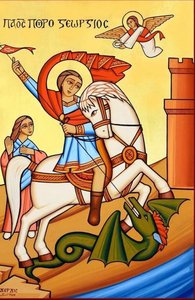
His upbringing
He was born in the year 280 AD in Cappadocia in Palestine, of noble, Christian, God-loving parents. His father Anastasious was a rich prince governing the province in God's fear. He took care of those who were in need. His mother's name was Theobesty. God gave them that saint after his two sisters, Kasieh and Madrouta. They raised him in a Christian upbringing, and he was nurtured on virtues and courage. His father died when he was 14 years old. Another prince took over all the cities of Palestine, and he was a righteous man. So his mother moved with her kids from Cappadocia to Diospolis, where she was originally from and where her possessions were.
St. George joined in the army. His reputation was spread out that the prince wanted him to marry his only daughter. And that's why he sent him first to the Emperor Diocletian accompanied by a hundred soldiers to show the Emperor his courage, and to have his name written in the annals of the kingdom. The Emperor gave him the title "Prince", and arranged for him 500 soldiers, and he generously gave him a lot of presents. Then St. George returned to his province; and the prince assigned to him his possessions after his departure. He did that in a party that he had for his daughter and St. George.
Continue reading…The Fiery Holy Spirit
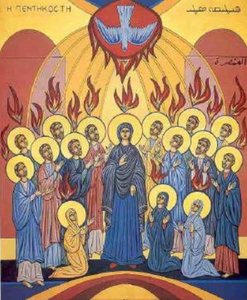
In Pentecost, the Holy Spirit dwelt on the disciples as tongues of fire, representing purification of the heart and inflaming it with divine love.
The Holy Spirit is the Spirit of sanctification and might. (Acts 1:8; Zach. 4:6) He is the fiery Spirit of God as St. Paul mentions, “For our God is a consuming fire,” (Heb. 12:29) and as Isaiah inquires saying, “Who among us shall dwell with the devouring fire? Who among us shall dwell with everlasting fire?” (Is. 33:14)
Our Lord Jesus came, as He said, to bring fire on earth, and, “How I wish it were already kindled!” (Lk. 12:49) He was talking about the Holy Spirit, the fire that He kindled in every earthly heart to sanctify, purify and inflame it with the fire of love, and to give it spiritual rapture so that it becomes a heavenly heart … a divine throne, similar to the fiery Cherubic chariot.
This type of heart is fervent in spirit, (Rom. 12:11) as it is manifested in prayer, contemplation, ministry or, in general, in loving Christ, His Church and His kingdom. This type of heart is also resolute in facing sin, leading to the sanctification of one's feelings and emotions for the sake of God – to live a life of joy, thanksgiving and sanctification.
Continue reading…Christ’s Resurrection and Ours
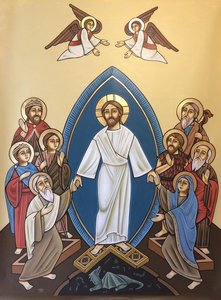
Isaiah prophesied that death would be trampled under Christ’s feet by saying, “He will swallow up death forever, and the Lord God will wipe away tears from all faces; the rebuke of His people He will take away from all the earth; for the Lord has spoken” (Is. 25:8). It is well known that sin is a reproach to any people (Prov. 14:34). St. Paul invoked this prophecy by saying, “For as in Adam all die, even so in Christ all shall be made alive” (1Cor. 15:22). That is, all men die like Adam because of the corrupted nature inherited from him, but we receive a new life, through Christ, in our bodies since our life in Christ leads us to our blessed resurrection. Through Christ’s resurrection, we are able to sing joyfully the song of victory, “O death, where is your sting? O Hades, where is your victory?” (1 Cor. 15:55), the same song foretold by the prophet Hosea about death which lost its power by the Savior: “I will ransom them from the power of the grave; I will redeem them from death. O Death, I will be your plagues! O grave, I will be your destruction!” (Hos 13:14).
If Christ is not risen, we will not rise; eternal death will be the end of our life, and we will be of all men the most pitiable (1Cor 15:19). If the hope we have in Christ is ended by this life, we’ll be deceived because we are suffering the afflictions of this life without legitimate hope in the life to come.
Christ’s resurrection is the perfect assurance for our resurrection, as St. Paul said, “But now Christ is risen from the dead, and has become the firstfruits of those who have fallen asleep” (1 Cor 15:20). He proved the fact of Christ’s resurrection without a doubt, which does not need any further proofs (1Cor 15:1-58), but gives hope and joy to the believers in eternal life. St. Paul declared that Christ, through His resurrection, became the firstfruits, meaning others who have “fallen asleep” will rise from the dead as well.
He Ascended into Heaven
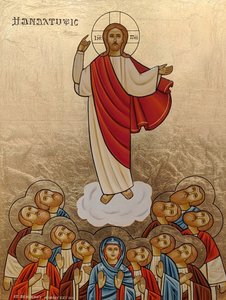
St. Luke is the only one who documented the date of the ascension of Christ, and the only one who described the beautiful scene of the ascension, as he writes that our Lord Jesus Christ took His disciples outside of Bethany, to the Mount of Olives, and He lifted up His hands and blessed them (Lk. 24:50) then He was taken up, and a cloud received Him out of their sight. (Acts 1:9)
Oftentimes, clouds where a sign of the presence of God, as in the prophesies, “He bowed the heavens also, and came down with darkness under His feet. He rode upon a cherub, and flew; And He was seen upon the wings of the wind.” (2 Sam. 22:10,11), “He lays the beams of His upper chambers in the waters, who makes the clouds His chariot, who walks on the wings of the wind.” (Ps. 104:3), “I was watching in the night visions, And behold, One like the Son of Man, Coming with the clouds of heaven! He came to the Ancient of Days, And they brought Him near before Him. Then to Him was given dominion and glory and a kingdom, That all peoples, nations, and languages should serve Him. His dominion is an everlasting dominion, Which shall not pass away, And His kingdom the one Which shall not be destroyed.” (Daniel 7:13,14)
Continue reading…I May Know Him and the Power of His Resurrection
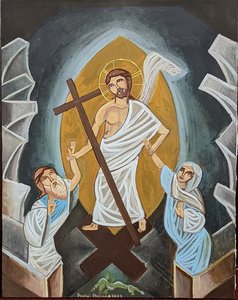
Before the Resurrection of Christ, all people feared death because they had never yet heard about “resurrection,” until the advent of Christ, who died on the cross and was buried; but it was impossible for Him to be captured by death. This was the same with all the prophets of the Old Testament. He rose from the dead, destroying the sting of death and through His Resurrection He conquered Satan who had the power of death, as St. Paul said, ”In as much then as the children have partaken of flesh and blood, He Himself likewise shared in the same, that through death He might destroy him who had the power of death, that is, the devil, and release those who through fear of death were all their life time subject to bondage.” (Heb. 2:14, 15)
Continue reading…